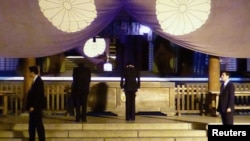SEOUL —
Japan's neighbors are reacting angrily to visits by cabinet ministers in Tokyo to a controversial war shrine.
South Korea's foreign minister, Yun Byung-se, has canceled a trip to Tokyo that had been set for this week.
Foreign Ministry spokesman Cho Tai-young said South Korea expresses “deep concern and regret” over the recent visits by Japanese officials to a Shinto shrine in Tokyo.
Cho said the Yasukuni shrine “glorifies an invasion that inflicted great loss and suffering on Japan's neighbors.”
Japan's deputy prime minister, Taro Aso, visited Yasukuni on Sunday. Aso also serves as finance minister and is a former prime minister.
Two other Cabinet ministers also visited the controversial shrine.
Japan's prime minister, Shinzo Abe, known for his nationalistic views, did not visit but sent a $500 donation in his name for a tree (cleyera japonica) branch altar decoration.
The Yasukuni shrine honors 2.5 million Japanese war dead - including 14 people convicted as Class-A war criminals following the end of World War II.
Countries which were subject to Japan's brutal colonization in the first half of the 20th century view Yasukuni as an enduring symbol of Japanese imperialism.
Speaking at a daily news briefing, a spokeswoman for China's foreign ministry called on Tokyo to "face up to its history of nationalistic aggression."
Hua Chunying, reacting to the Yasukuni visits, said only when Japan is able to deeply understand its past history and respect the feelings of the victims of its colonialism will it be able to "develop a cooperative relationship with other Asian countries."
The Chinese communist party's newspaper is condemning the prime minister's offering to the shrine. The People's Daily says regardless of what form worship at Yasukuni takes, it demonstrates a “wrong-headed view of history that deals a great blow to peace and stability” in Asia.
Japanese officials are attempting to downplay the significance of the visits to the shrine.
The Japanese chief cabinet secretary, Yoshihide Suga, said the government is not taking a position on personal religious visits made by officials.
Suga said each country is entitled to its position on this, but the ministers' visits should not affect diplomacy.
Tomohiko Taniguchi, councilor at the Cabinet Secretariat in the Japanese prime minister's office, elaborates on this, saying the appearances of the officials at the shrine are being misconstrued.
“From my personal perspective it is the shrine not for cherishing aggression of any sort. It is the place for people to pay homage to those people who died, lost their lives, during the wars," he said. "What you saw done by some of the members of the Japanese Cabinet were the actions taken by those individuals in no way representing the Japanese government's official views.”
Visits by government officials in previous Japanese cabinets have sparked similar diplomatic protests from Seoul and Beijing.
South Korea's foreign minister, Yun Byung-se, has canceled a trip to Tokyo that had been set for this week.
Foreign Ministry spokesman Cho Tai-young said South Korea expresses “deep concern and regret” over the recent visits by Japanese officials to a Shinto shrine in Tokyo.
Cho said the Yasukuni shrine “glorifies an invasion that inflicted great loss and suffering on Japan's neighbors.”
Japan's deputy prime minister, Taro Aso, visited Yasukuni on Sunday. Aso also serves as finance minister and is a former prime minister.
Two other Cabinet ministers also visited the controversial shrine.
Japan's prime minister, Shinzo Abe, known for his nationalistic views, did not visit but sent a $500 donation in his name for a tree (cleyera japonica) branch altar decoration.
The Yasukuni shrine honors 2.5 million Japanese war dead - including 14 people convicted as Class-A war criminals following the end of World War II.
Countries which were subject to Japan's brutal colonization in the first half of the 20th century view Yasukuni as an enduring symbol of Japanese imperialism.
Speaking at a daily news briefing, a spokeswoman for China's foreign ministry called on Tokyo to "face up to its history of nationalistic aggression."
Hua Chunying, reacting to the Yasukuni visits, said only when Japan is able to deeply understand its past history and respect the feelings of the victims of its colonialism will it be able to "develop a cooperative relationship with other Asian countries."
The Chinese communist party's newspaper is condemning the prime minister's offering to the shrine. The People's Daily says regardless of what form worship at Yasukuni takes, it demonstrates a “wrong-headed view of history that deals a great blow to peace and stability” in Asia.
Japanese officials are attempting to downplay the significance of the visits to the shrine.
The Japanese chief cabinet secretary, Yoshihide Suga, said the government is not taking a position on personal religious visits made by officials.
Suga said each country is entitled to its position on this, but the ministers' visits should not affect diplomacy.
Tomohiko Taniguchi, councilor at the Cabinet Secretariat in the Japanese prime minister's office, elaborates on this, saying the appearances of the officials at the shrine are being misconstrued.
“From my personal perspective it is the shrine not for cherishing aggression of any sort. It is the place for people to pay homage to those people who died, lost their lives, during the wars," he said. "What you saw done by some of the members of the Japanese Cabinet were the actions taken by those individuals in no way representing the Japanese government's official views.”
Visits by government officials in previous Japanese cabinets have sparked similar diplomatic protests from Seoul and Beijing.









